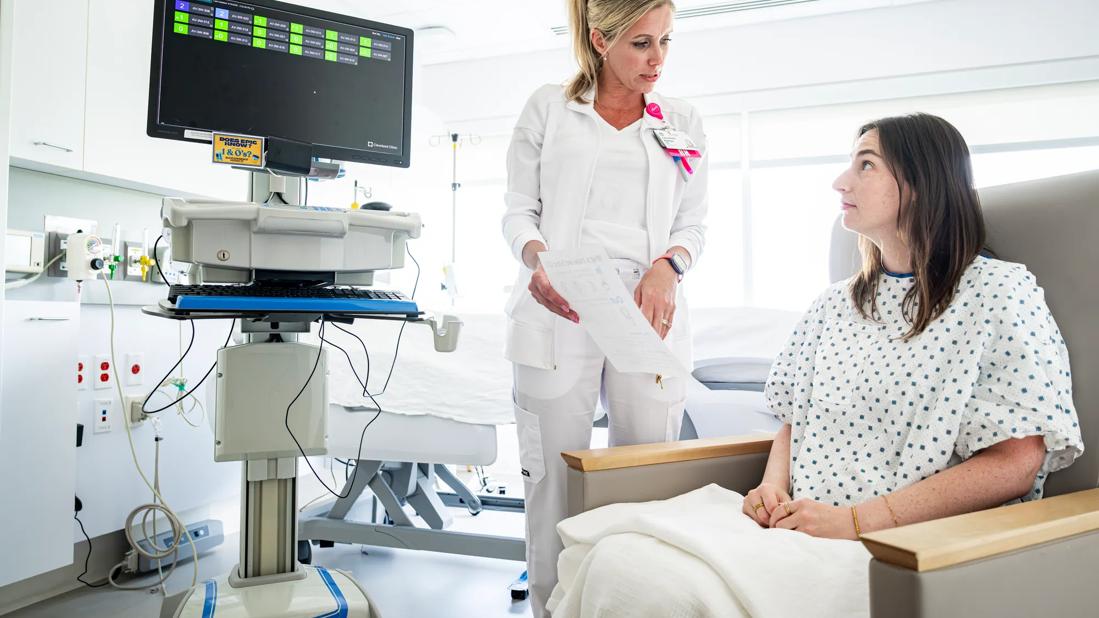Nurses facilitate preoperative program to educate and prepare patients for ongoing care

Healthcare systems strive to reduce patients’ hospital length of stay (LOS) through efficient bed management and throughput processes. However, there are many variables that influence LOS, and care coordination is one important factor. Cleveland Clinic implemented the Post-Acute to Home (P.A.T.H.) Program to eliminate discharge barriers and reduce LOS.
Advertisement
Cleveland Clinic is a non-profit academic medical center. Advertising on our site helps support our mission. We do not endorse non-Cleveland Clinic products or services. Policy
The program is designed to promote awareness regarding the possibility of care needed after an acute hospital stay and educate patients and families on different levels of post-acute care (PAC). The pilot began in August 2020 to address the needs of elective cardiothoracic surgery patients.
“The goal is for patients to be discharged home. But in the event that they must be diverted, pre-planning prevents them from being blindsided,” explains Auda Castillo, BSN, RN, CPHN, ACM, Care Continuum Advisor for the Heart, Vascular & Thoracic Institute. “Patients and families are appreciative that we speak to them ahead of time and are proactive about their post-acute care.”
After the pilot phase was completed in August 2021, P.A.T.H. expanded to the Head & Neck Institute. In 2022, the program was opened to all patients undergoing cardiothoracic and orthopedic surgeries.
Alice Kim, MD, MBA, Medical Director of Enterprise Medical Operations, who leads the Long-Term Acute Care Hospital and Inpatient Rehabilitation (LTACH/IRF) joint venture and inpatient care coordination, championed the program, which is facilitated by care continuum advisors (CCAs).
“The role of the CCA is key to longitudinal care coordination,” says Dr. Kim. “Early outreach is critical for helping patients and families understand what may happen during their hospital course. These conversations help them prepare to their best ability for the care needs that may arise after discharge from the hospital.”
CCAs contact patients prior to surgery to complete a comprehensive assessment, which includes:
Advertisement
All the information obtained is placed in the patient’s electronic medical record, where it can be accessed by providers and the inpatient team. Once the patient is admitted, the inpatient care management team takes over.
“Should the patient have a post-acute need, the inpatient care manager can locate the CCA’s notes, find the choices selected by the patient and send a referral [to the agency or facility], therefore expediting the discharge process,” explains Dr. Kim.
The P.A.T.H. program is successful. Between mid-March 2021 and the end of June 2022, 90% of cardiothoracic program patients who were discharged to a post-acute facility or service were matched with one of the choices they selected prior to hospital admission.
Perhaps more telling than the statistics are the stories shared by Castillo and Pamela Burton, BSN, RN, CCM, Care Coordinator for the Head and Neck Cancer Program. For instance, Burton helped an elderly patient whose two sisters were concerned about her memory problems. Burton met with all three women, and together they found a skilled nursing facility where the patient could be admitted following her surgery before transitioning into assisted living memory care. Case managers at the facility were included in the planning.
“The P.A.T.H. program provided the opportunity to identify the patient’s needs and transition her into a new, safe living environment following her surgery,” says Burton.
Cleveland Clinic hopes to adopt the program in all of its Northeast Ohio hospitals.
Advertisement
“This kind of care coordination in the ambulatory setting lays the foundation for patient education and the start of care coordination that will carry through the patient’s hospital stay and journey through recovery,” says Dr. Kim.
Advertisement
Advertisement

Planning continues with critical, patient-focused input from nursing teams

Strengthening care through targeted resources and frontline voices

Embracing generational differences to create strong nursing teams

CRNA careers offer challenge and reward

An unexpected health scare provides a potent reminder of what patients need most from their caregivers

Cleveland Clinic Abu Dhabi initiative reduces ICU admissions and strengthens caregiver collaboration

Veteran nurse blends compassion, cutting-edge transplant training and military tradition to elevate patient care

Embrace coaching and other tips to be a stronger leader